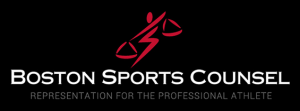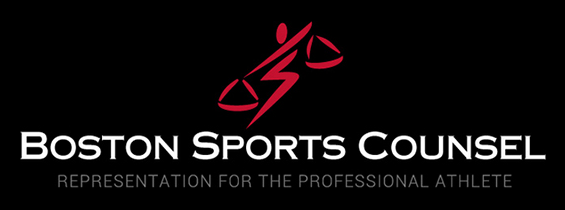The following “Interview with the Agent” with Dan Rosquete, Founder/CEO of Boston Sports Counsel, was conducted by Belmont University Law School student and aspiring sports/entertainment agent Mark J. Burns.

Mark Burns: You founded Boston Sports Counsel after finishing your undergraduate career, Master’s, and law school. What motivated you to start your own sports agency? As a follow-up, why did you decide to work in athlete representation?
Dan Rosquete: To be completely honest I was motivated to found, Boston Sports Counsel, as a full service law firm that represents professional athletes because upon graduation from law school I had no job offers.
Growing up I always knew I was going to work within sports but was uncertain as to whether it was going to be working for a professional team or on the player representation side. However, things changed in 2004 when the San Francisco Giants drafted my college roommate. For example, as he grinded through the minor league system I decided to spend all my free time, school permitting, and assuming it was in season with him. In doing so I received a crash course of the inner workings of baseball, the struggles of the minor league player, and decided player representation was the field I wanted to pursue.
Mark Burns: What Players Associations are you certified with? What sports are you most specifically involved?
Dan Rosquete: I am a licensed attorney in the state of Massachusetts and a Certified Major League Baseball Player agent with the Major League Baseball Players Association (MLBPA). Currently I am only specifically involved in representing baseball players whether they are an amateur player just beginning their careers, a current professional player, or a retired player beginning to focus on life after baseball.
Mark Burns: Besides contract negotiation, what other services does Boston Sports Counsel provide to its clients?
Dan Rosquete: Some of our other services include but are not limited to general legal services, post career management, marketing, amateur (Rule 4) draft preparation, international (July 2nd) contract procurement, salary arbitration, endorsements, public appearances, equipment procurement, and public and goodwill relations.
Mark Burns: With there being so many agents and agencies that exist today, how do you individually as an agent try and differentiate yourself from the fierce competition?
Dan Rosquete: Differentiating yourself from the other groups is difficult. Not so much because there are so many groups but because there are so many groups that do a good job.
However, as an agent I try to emphasize my strengths. I cannot be concerned with what the other groups are doing because I have no control over what they do. Instead, I try to differentiate myself by staying true to my core values of honesty, hard work, and treating people fair. I really try to get to know the individuals I am blessed to work with and/or hope to work with.
Mark Burns: What is one big challenge you had to overcome in regards to progressing in your career? What did you learn from that challenge?

Dan Rosquete: Recruiting. When I started the firm I had next to little experience. I had never interned, had limited contacts, and I had to teach myself how to run a sports representation firm. However, without clients and successful recruiting I was destined to be a failure so I learned how to be resourceful, worked on improving myself, and ultimately learned that sports representation was exactly what I wanted to do and through hard work I could make that happen. I also learned that recruiting, although difficult, was something I was very good at and as a result have been able to build up a nice client list.
Mark Burns: What has been the most rewarding aspect of working with professional athletes?
Dan Rosquete: Getting to know great people from all over the world and helping them accomplish and work towards their dreams.
Mark Burns: How has the agency business changed since you first started?
Dan Rosquete: Major League Baseball’s Collective Bargaining Agreement has changed, thus affecting the draft and international signing rules. There are more sports representation groups and I have started to see a trend to more agent regulation within the MLBPA, colleges, universities, and individual state laws.
Mark Burns: If there is any area of the sports agency business you would like to change, what would that be and why?
Dan Rosquete: In a perfect world there would be more loyalty and more accountability for over-promising and under-delivering, but overall I think the business does a good job regulating itself. Nevertheless, when I meet with potential clients I stress loyalty and effective communication because without each my job as a their agent will be compromised.
I would like to see these changes happen because as the rules governing agents currently stand, no commission is charged before the MLB player is above the league minimum. Thus no agent wants to represent a player for several years only for the player to switch agents right before he is about to enter into a contract that would have rewarded both the client and former agent for all their work leading up to that new negotiated agreement.
Mark Burns: In 140 characters or less, what advice would you give to aspiring sports/entertainment business professionals who want to work in the sports agency world?
Dan Rosquete: BALANCE FAMILY AND WORK. Stay true to your core values, work hard, treat people honestly, and fairly. Believe in yourself and go get the job done.
